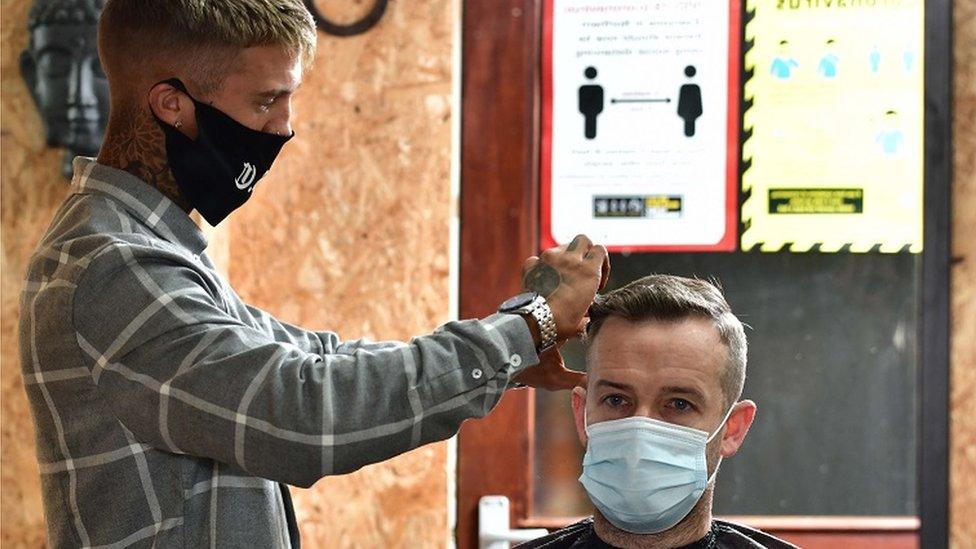NI business review of 2020: Year dominated by Covid-19
- Published

A sign of the times - many businesses were forced to close for long periods this year
In February one business group warned that Covid-19 would have a 1% impact on Northern Ireland tourism.
Little did we know that just four weeks later the entire sector - and so many others - would be shut down to stop the spread of coronavirus.
BBC News NI reflects on a year in business dominated by the pandemic.
Turbulent time for airline industry
The UK airline Flybe went into administration in March - it was a huge blow to the Northern Ireland aviation industry before the Covid-19 crisis hit.
Since then airlines all over the world have been shedding jobs and Northern Ireland airports have been haemorrhaging money.

From the collapse of Flybe to bans on travel, the airline industry suffered heavily in 2020
Not only are people not booking holidays but holidaymakers disappointed by cancellations are looking for refunds from travel agents and airlines.
That will also affect demand for planes and have a knock-on effect on the aerospace sector, including one of Northern Ireland's largest employers, Spirit Aerosystems - formerly Bombardier - which changed ownership in a deal completed this year.
Footing the wage bill
As huge parts of the economy were forced to close in response to the pandemic in March, Chancellor Rishi Sunak announced an unprecedented intervention.
The job retention scheme - known as furlough - initially paid 80% of workers' wages, even more generous than business lobby groups had asked for.
At its peak, it supported almost a quarter of a million workers in Northern Ireland.
But so many jobs could not be saved.
The number of people on unemployment-related benefits doubled even with government support.

Town and city centres usually busy with shoppers were all but deserted for much of the year
Since March employers have proposed making more than 10,000 workers redundant - about half of those were in manufacturing and retail.
The furlough scheme has been extended until April - a warning sign that the government does not expect things to be back to normal any time soon.
Employers still have to contribute towards the wages of staff on furlough, something that becomes increasingly challenging when businesses are closed.
The Beannchor Group - which owns a list of hotels, pubs and restaurants in Belfast - said furlough contributions cost it £30,000 a week while its shutters were down.
'Lessons not learned' from lockdowns
As each lockdown came, pain was felt across the various sectors forced to close, like non-essential retail and hospitality.
Business groups were frustrated at how significant decisions were communicated, often at short notice.

Covid-safe guidelines have changed the consumer experience
Each sector would call for financial support, a date to reopen and guidance about trading safely.
That cycle built up hopes and dashed them again as dates were pushed back at short notice.
A number of different industries said they felt lessons were not learned from March and that again in October and December they felt things could have been handled differently.
New ways of working but at what cost?
Many businesses had no choice but to adapt, whether that was by introducing online ordering, offering takeaway, or installing outdoor seating or screens and other equipment to protect staff from the virus.
All of those changes were at an extra cost to businesses at a time when they did not have money coming in.
There were also new ways of operating in hospitality, for example, with rules on who could sit together and for how long.
Each of those restrictions chipped away at profitability.

Many bars in Belfast have been counting the cost of closure
Some big names in hospitality, like the Duke of York pub in Belfast's Cathedral Quarter, decided it was not worth reopening in 2020.
A huge amount of financial support was offered to businesses but as each scheme was announced, gaps were identified.
No one policy could help everyone and many traders fell outside the criteria for any support.
The fall of the giants
The high street had a number of big casualties in 2020, some of which had been struggling before the pandemic.
Closing shops during lockdowns sped up shifts in consumer behaviour as shoppers were forced online.
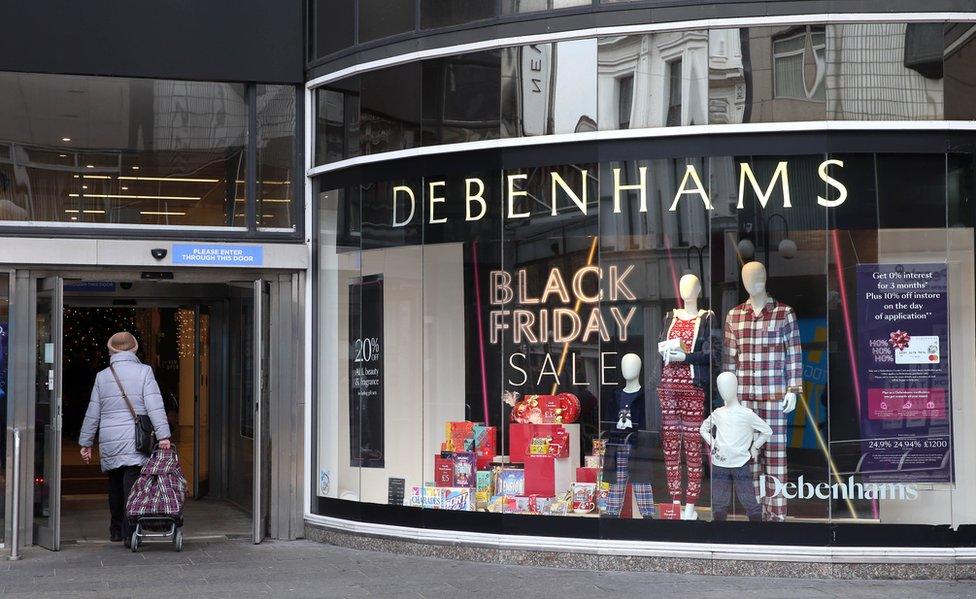
The loss of Debenhams will leave big units vacant in many large shopping centres
Big names like Eason, Oasis and Warehouse disappeared from towns, cities and shopping centres.
Debenhams, which was already in administration, was not able to find a buyer, leading to hundreds of job losses in Northern Ireland.
Hundreds more jobs are at risk at the Arcadia group - which owns once-iconic brands such as Topshop and Dorothy Perkins - which is also in administration.
Road to recovery?
Many other businesses did not survive 2020.
Arguably some of them - like the big chains already mentioned - had underlying health issues.
For others, the pandemic meant their work dried up overnight.
But some managed to thrive.
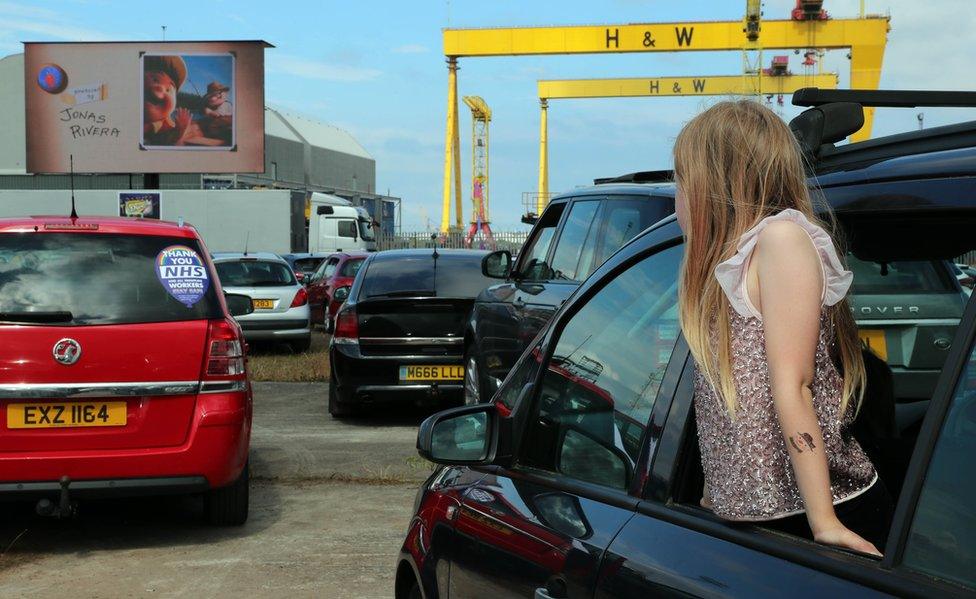
Many business owners thought of creative ways to earn, such as opening drive-in cinemas after the first lockdown
With some creative thinking, manufacturers of everything from sportswear to window blinds switched their operations and staff to make protective equipment to help fight against Covid-19.
Some food producers had a huge rise in demand and continued to grow and create jobs in spite of the pandemic.
And demand also grew in other areas, like the delivery sector, where people who lost their jobs in lots of different sectors are now looking to work.
While many of the economic indicators, like unemployment, paint a bleak picture, the take-up of things like the furlough scheme show how the effect of the pandemic could have been much worse without government help.
Unfortunately the economy is not out of the woods yet.
The news of a Covid-19 vaccine will mean the economic recovery can start next year but another lockdown from now until February will mean more financial pain.

Some food businesses have thrived but it has been a testing year for suppliers to the hospitality sector
Economists predict it will be years before the Northern Ireland economy bounces back fully from the crisis.
The pace of that recovery will also depend heavily on how government support is extended.
Add Brexit to the mix, with 2020 marking the end of the transition period.
Throughout the year businesses in Northern Ireland have not known whether they would be leaving the EU with a trade deal or on World Trade Organisation terms.
However, they do now have some certainty on how the Northern Ireland protocol will work - that will help their planning for 2021.
A year best forgotten?
In 2020, business groups were pitted against the health service in a "health versus wealth" narrative.
None of the dozens of business owners I spoke to wanted to get sick or put the lives of their staff, customers or families at risk.
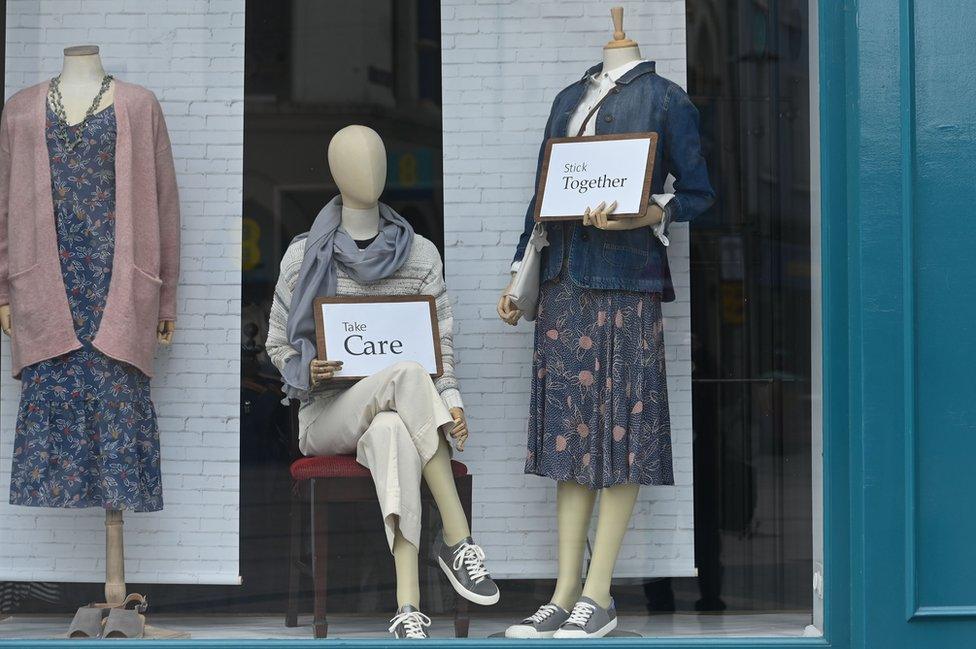
Retailers are hoping for an upturn in fortunes in 2021
Many said they would rather stay closed but they could not afford to.
Unfortunately the effect on many business owners will extend to their own homes, their families and their mental health.
Many business groups will be glad the year is over and will behoping for some signs of growth in 2021.
The interconnected relationship between the two sides of this crisis means the only way to get the economy back to normal is by dealing with the health crisis and reducing the pressure on the health service.
Uncertainty continues and it might not be until the second half of 2021 that businesses can return to some sort of normality.
But at least they can take some comfort that there is hope - an end is in sight to the costly cycle of lockdowns and reopenings.
- Published17 December 2020
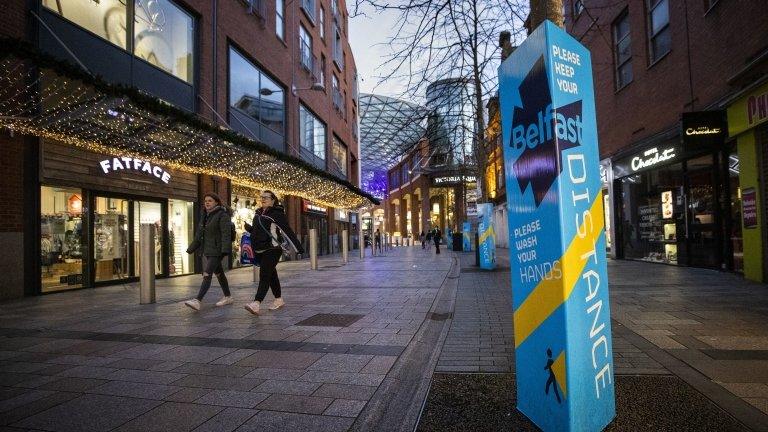
- Published11 January 2021
